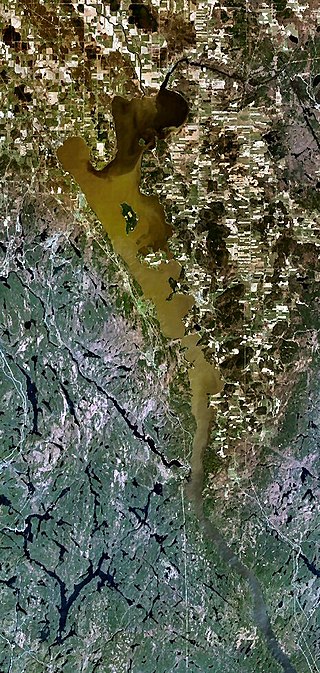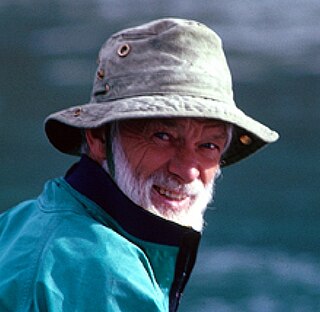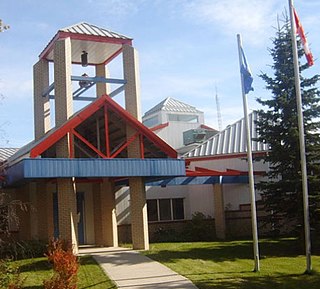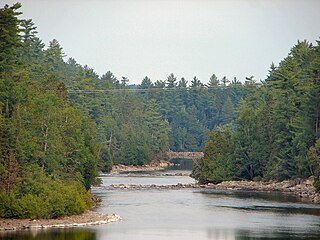
The Ontario Northland Railway is a Canadian railway operated by the Ontario Northland Transportation Commission, a provincial Crown agency of the government of Ontario.

Temiskaming Shores is a city in the Timiskaming District in Northeastern Ontario, Canada. It was created by the amalgamation of the town of New Liskeard, the town of Haileybury, and the township of Dymond in 2004. The city had a total population of 9,634 in the Canada 2021 Census. Temiskaming Shores is Ontario's second-smallest city, in terms of population, after Dryden. Haileybury is the seat of Timiskaming District.

Cobalt is a town in Timiskaming District, Ontario, Canada. It had a population of 1,118 at the 2016 Census. The population is now closer to 943.

Lake Timiskaming or Lake Temiskaming is a large freshwater lake on the provincial boundary between Ontario and Quebec, Canada. The lake, which forms part of the Ottawa River, is 110 kilometres (68 mi) in length and covers an area of almost 295 km2 (114 sq mi). Its water level ranges between 175 m (574 ft) and 179 m (587 ft) above sea-level, with a mean annual average of 178.4 m (585 ft). The lake is in places up to 216 m (709 ft) deep. There are several islands on the lake, notably Mann and du Collège Islands.

Bill Mason was a Canadian naturalist, author, artist, filmmaker, and conservationist, noted primarily for his popular canoeing books, films, and art as well as his documentaries on wolves. Mason was also known for including passages from Christian sermons in his films. He was born in 1929 in Winnipeg, Manitoba, and graduated from the University of Manitoba School of Art in 1951. He developed and refined canoeing strokes and river-running techniques, especially for complex whitewater situations. Mason canoed all of his adult life, ranging widely over the wilderness areas of Canada and the United States. Termed a "wilderness artist," Mason left a legacy that includes books, films, and artwork on canoeing and nature. His daughter Becky and son Paul are also both canoeists and artists. Mason died of cancer in 1988.

Royal St. George's College (RSGC) is an Anglican-affiliated independent school for boys located in The Annex neighbourhood of Toronto, Ontario, Canada. The school admits boys from Grades 3 through 12. Founded in 1961 as an Anglican choir school in the tradition of the great collegiate and cathedral choir schools in the United Kingdom, the school admitted its first students in 1964. It is the only pre-university school in Canada authorized to use the "Royal" designation, and it houses the historic Chapel of St. Alban-the-Martyr, the former cathedral of the Anglican Diocese of Toronto. RSGC is also the choir school for the Cathedral Church of St. James.

Témiscaming is a city located at the south end of Lac Témiscamingue on the upper Ottawa River in the Témiscamingue Regional County Municipality of western Quebec, Canada. Also nearby is Lake Kipawa.

Saint John's School of Alberta (SJSA) was a small private boys' boarding school in Genesee, Alberta, Canada which operated from 1968 to 2008, the second of three such schools founded on conservative Anglican ideas and the notion that children were not challenged by present-day society. It closed in June 2008. Ted Byfield was one of the school's founders.

Edward Bartlett Byfield was a Canadian conservative journalist, publisher, and author. He founded the Alberta Report, BC Report and Western Report newsmagazines.

Devil's Rock is a granite escarpment located 5 kilometres (3 mi) south of Temiskaming Shores, Ontario, Canada. The cliffs rise 300 feet (91 m) above Lake Timiskaming and extend nearly as far underwater as they do above, giving Devil's Rock a cliff face roughly 600 feet (180 m) tall.

Lakefield College School is a private day and boarding school located north of the village of Lakefield, Ontario. It was the first Canadian member of Round Square, an international affiliation of schools.

The Diocese of Rupert's Land is a diocese of the Ecclesiastical Province of Rupert's Land of the Anglican Church of Canada. It is named for the historical British North American territory of Rupert's Land, which was contained within the original diocesan boundaries.
The Diocese of Algoma is a diocese of the Ecclesiastical Province of Ontario of the Anglican Church of Canada. It comprises nearly 182,000 square kilometres of the Ontario districts of Algoma, Thunder Bay, Sudbury, Manitoulin, and parts of the districts of Nipissing and Timiskaming. The diocese forms a wide band stretching from just west of Thunder Bay on the northern shore of Lake Superior east to the border of Ontario and Quebec. Neighbouring Anglican dioceses are Rupert's Land to the west, Moosonee to the north, Ottawa to the east, and Ontario, Toronto, Huron to the south.

The Kipawa River is a short river in western Quebec, Canada. It is mostly an undeveloped river but the larger lakes have dams, fishing camps, and cottages on their shores. The communities of Kipawa and Laniel are located on Lake Kipawa. Also much logging takes place within its watershed basin, which is consequently crisscrossed by many bush roads. Route 101 crosses the river at Laniel.
Saint John's Cathedral School (SJCS) was a private Anglican boarding school for boys named for the Saint John's Cathedral in Winnipeg, Manitoba, Canada, out of whose youth program it had emerged". It was the first in a series of schools, operated from 1958 until 2008, by an Anglican lay religious order called the Company of the Cross.
The Company of the Cross was a lay religious order which was affiliated with the Anglican Church of Canada when founded in 1957 by Frank Wiems and Ted Byfield. For many years, the Company operated under the authority of the Anglican bishops in Winnipeg, the diocese of Edmonton and the diocese of Toronto On November 17, 1990, the Company of the Cross was unincorporated in Manitoba.

Chamberlain is a township in the Canadian province of Ontario, located within the Timiskaming District.

The Ottawa-Bonnechere Graben is a geological structure that coincides with a 55 km (34 mi) wide topographic depression extending from near Montréal through Ottawa. It is part of the Saint Lawrence rift system that also includes the seismically active Saguenay graben. This rift valley was formed when the Earth's crust moved downward about a kilometre between two major fault zones known as the Mattawa and Petawawa faults.
Elections were held in the organized municipalities in the Timiskaming District of Ontario on October 25, 2010 in conjunction with municipal elections across the province. An X beside a candidate indicates the candidate is the incumbent.

The Mugwump is a lake monster which has been alleged to live in Lake Timiskaming, on the border of the Canadian provinces of Ontario and Quebec.















